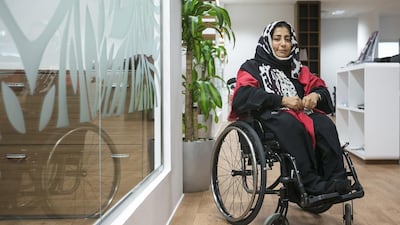ABU DHABI // Employers who wish to recruit graduates with disabilities must raise their awareness about meeting their needs, says a leading centre for people with special needs.
Fatma Al Qassimi, manager of Zayed University’s office of accessibility for students with disabilities, said it was not just about employing people with special needs, but also providing the means and the environment for them to function effectively.
Ms Al Qassimi, who contracted polio at the age of three and uses a wheelchair, has dedicated her life to empowering people with disabilities.
“I am happy about it. I believe that whatever we have is for a good reason. Maybe I am supposed to have this [polio] so I can help and empower others with disabilities,” she said.
A former staffer at the Ministry of Education and the owner of a jewellery business, Ms Al Qassimi said she did not feel satisfied even though she was doing well.
“I felt something was missing in my life,” she said.
In January 2010, Zayed University contacted her to establish the office of accessibility to serve students with special needs.
“I felt that without an assistive technology centre, students with special needs would not have equal education opportunities like everyone else,” she said.
In 2012, the university set up the Khalaf Al Habtoor Assistive Technology Resource Centre in Dubai, followed by the Humaid Matar Al Tayer Assistive Technology Resource Centre in Abu Dhabi last year.
The centres turned the curricula of all courses into Braille for visually-impaired students. For the first time at Zayed University, these students had full access to education.
“The entire curriculum was enlarged so people with low vision could read it,” said Ms Al Qassimi. “[Students with special needs] are our responsibility. We take care of them from A to Z from the moment they enter the university. We ask them what their needs are and we offer them training on needed assistive technology devices.
“We then fully integrate them with the other students. We support them but they are fully included in the classroom to allow them to grow and develop their skills.”
Other services include mobility training to help students move around the campus independently.
Ms Al Qassimi said some visually-impaired students did not use a walking cane because they were relying on others to guide their movements or they had a helper on hand.
“[But] I tell them that by the time they graduate, they have to be independent, able to work, to add to their society like everybody else,” said Ms Al Qassimi.
Watching these students use the canes to walk around campus was “her reward”.
“I see the improvement in them and I feel like I have done something worthwhile. I have empowered them,” said Ms Al Qassimi.
There are more than 100 students with special needs at the Abu Dhabi and Dubai campuses of Zayed University.
Ms Al Qassimi said she wanted nationwide education for students with special needs. “We would love to see this in all schools and education institutions in the UAE,” she said.
According to her, many employers, including five major organisations, this year asked to recruit Zayed University graduates with disabilities.
However, employers still lacked awareness about recruiting people with disabilities, said Ms Al Qassimi.
“If you will recruit a person with a disability then you have to provide the right tools and equipment to allow them to fulfil their work responsibilities. For example, providing them with specific computer software or certain devices according to their needs,” she said.
Zayed University’s assistive technology centres also provide guidance and training to organisations that wish to hire graduates with disabilities.
“We consult with them and provide the necessary equipment or software. We also advise them on how to make the environment accessible and the adaptations needed to accommodate the graduates,” said Ms Al Qassimi.
salnowais@thenational.ae

